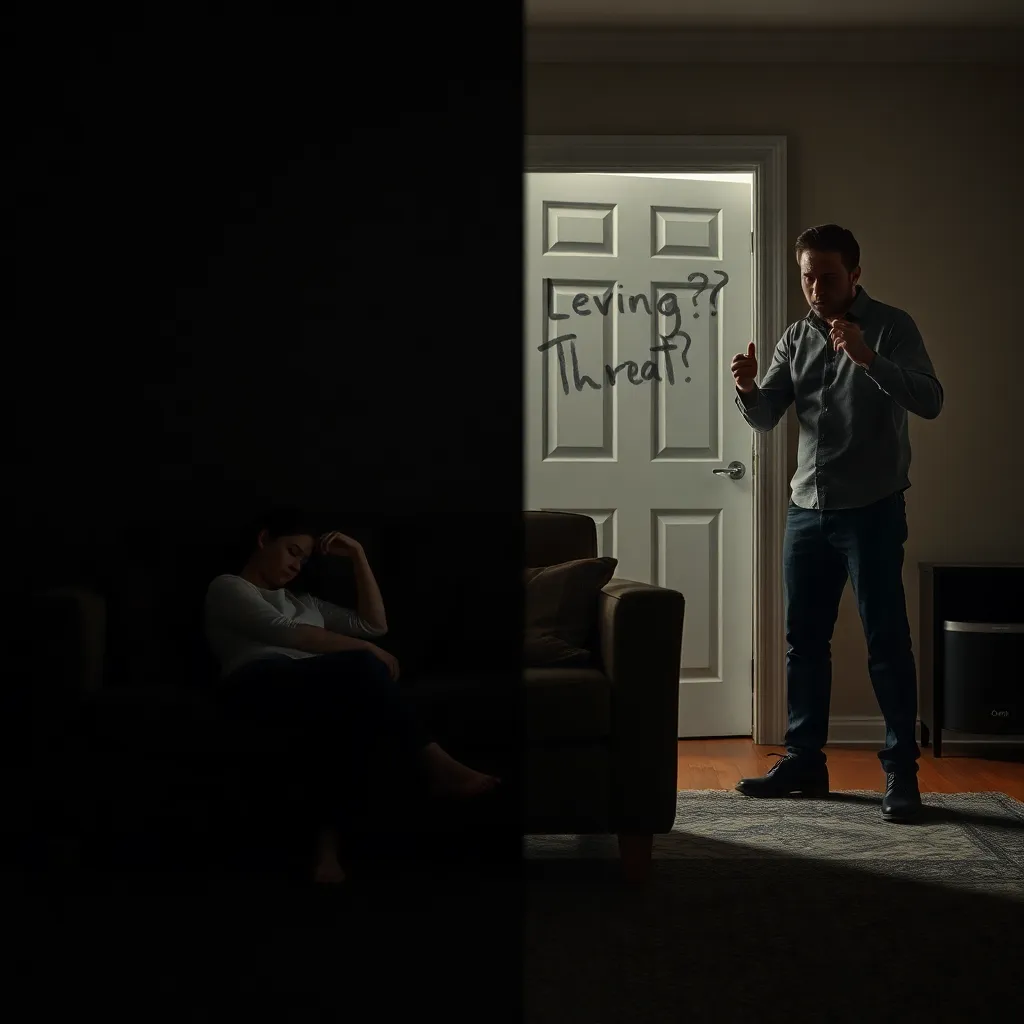Navigating the complexities of a relationship can be both rewarding and challenging, but when emotional abuse enters the picture, it can leave you feeling confused and isolated. You deserve to feel safe and respected, and understanding the subtle signs of emotional abuse is a crucial step toward regaining control and clarity in your life. Emotional abuse can often be masked by justifications that seem plausible, making it difficult to identify and address. This article aims to illuminate those red flags, offering you the insight needed to recognize when anger is being unjustifiably turned against you.
Your emotional well-being is paramount, and being able to spot these red flags can empower you to take the necessary steps toward a healthier relationship. Emotional abuse doesn’t always manifest through overt actions; sometimes, it’s hidden behind words and behaviors that make you doubt your perceptions. By exploring the 15 red flags of emotional abuse, you will gain a deeper understanding of the tactics used to justify rage and how they might be affecting your life. Each sign we discuss is a step toward reclaiming your self-worth and establishing boundaries that protect your heart.
In this journey, acknowledging the signs is the beginning of healing, and you are not alone in this process. This article will provide practical advice and emotional support to help you navigate your path forward. As you read on, remember that recognizing these red flags is not just about identifying problems but also about empowering yourself with the knowledge to foster healthier, more fulfilling relationships. Together, we will explore these signs and equip you with the tools to advocate for the respect and love you deserve.
1. Blame Shifting in Arguments

In many emotionally abusive relationships, you might notice a pattern of **blame shifting** during arguments. This tactic is used to divert attention from the abuser’s behavior and make you feel responsible for the conflict.
Imagine a situation where you express your feelings about a hurtful comment, and suddenly, the conversation flips to how you always overreact. This manipulation leaves you questioning your own reality and feeling **guilty** for bringing up your concerns.
Experts suggest that consistently experiencing blame shifting can erode your **self-esteem** and lead you to doubt your own perceptions. It’s crucial to recognize this pattern early and understand that this behavior is not your fault.
To handle blame shifting, try to remain calm and refocus the conversation on the original issue without getting sidetracked.
Remember, a healthy relationship involves mutual respect and accountability. Recognizing blame shifting as a red flag can be the first step towards seeking healthier interactions and protecting your emotional well-being.
2. Frequent Jealous Outbursts

Frequent jealous outbursts can be a significant indicator of emotional abuse, often masked as a sign of deep affection. These outbursts may come unexpectedly, leaving you feeling like you’re constantly walking on eggshells, unsure of what might trigger the next episode.
In many cases, the abuser might accuse you of infidelity or flirtation without any evidence, using these suspicions to justify their behavior. This can lead to a cycle of constant reassurance, where you find yourself explaining your actions and seeking ways to prove your loyalty.
Experts suggest that this type of behavior often stems from the abuser’s own insecurities and need for control rather than any real threat to the relationship. Understanding this can help you see these outbursts for what they are—an attempt to dominate rather than a reflection of your actions.
Addressing jealousy requires open communication and a commitment to building trust from both partners. Remember, you deserve to be in a relationship where both partners feel secure and respected, without fear of unjust anger.
3. Constant Criticism of Choices

Transitioning from jealousy, another red flag is the constant criticism of your choices, which can erode your self-esteem over time. Such criticism often masquerades as concern but is actually a way to control and diminish your confidence.
Imagine planning a night out with friends, only to be met with disparaging remarks about your decision. This behavior isn’t about your well-being; it’s about undermining your independence and instilling doubt in your ability to make sound choices.
According to relationship experts, consistent criticism is a tactic used by emotional abusers to create a dependency on their approval. By criticizing your every move, they aim to make you question your judgment, making it easier for them to manipulate your decisions in the future.
To counteract this, start by setting clear boundaries and communicating how these criticisms affect you. Remember, it’s crucial to surround yourself with supportive individuals who respect your choices and encourage your growth.
Ultimately, recognizing this pattern and taking steps to assert your autonomy can empower you to build healthier relationships. By understanding that you deserve to be treated with respect, you lay the groundwork for a more supportive and loving partnership.
4. Silent Treatment Punishments

Another subtle yet powerful form of emotional abuse is the silent treatment, which often follows on the heels of criticism. In this scenario, the abuser uses silence as a tool to exert control, leaving their partner in a state of uncertainty and emotional turmoil.
Imagine a situation where after a disagreement, your partner refuses to speak to you for days. This can leave you feeling invisible and anxious, desperately trying to figure out what went wrong and how to make amends.
Experts suggest that the silent treatment is not just a reaction to anger but a strategic manipulation to shift the blame onto the victim. By doing so, the abuser avoids accountability, making their partner feel responsible for resolving the conflict.
To address this, it’s crucial to establish healthy boundaries and communicate your feelings openly when the silent treatment occurs. This might involve expressing how the silence affects you and requesting a more constructive way to handle disagreements.
Understanding that the silent treatment is a form of emotional manipulation can empower you to seek healthier interactions. By recognizing these patterns, you can take steps towards nurturing a more supportive and communicative relationship.
5. Gaslighting to Alter Reality

Gaslighting is a subtle yet powerful form of emotional abuse where someone deliberately tries to make you doubt your own reality. This tactic often leaves the victim feeling confused, questioning their perceptions, and wondering if they are overreacting.
In many relationships, a partner might use gaslighting by consistently denying events or conversations ever happened. For example, if you bring up a previous argument, they might respond with, “I never said that,” or “You’re imagining things,” which can make you second-guess yourself.
Experts recognize gaslighting as a manipulation technique that can deeply impact one’s mental health and self-esteem. Dr. Robin Stern, author of “The Gaslight Effect,” notes that over time, this abuse can erode a person’s sense of self, leading them to rely more on the abuser’s version of reality.
To protect yourself from gaslighting, it’s important to maintain a firm grasp on your reality by documenting events and conversations. Keeping a journal or voice notes can help you feel more grounded and validate your experiences when they are questioned.
Ultimately, recognizing gaslighting is the first step towards reclaiming your power and ensuring that your voice is heard and respected. Protecting your reality is essential for fostering a relationship based on mutual respect and genuine understanding.
6. Isolating from Friends and Family

Another insidious tactic of emotional abuse is when a partner begins to isolate you from your loved ones. This often starts subtly, with requests for more time together that gradually evolve into demands to avoid family and friends altogether.
Your partner might use various excuses to justify this behavior, claiming they need you all to themselves or that your friends are a “bad influence.” They may even insist that these relationships are distracting you from focusing on them, creating a sense of guilt and obligation.
Over time, this isolation can leave you feeling alone and dependent solely on the abuser for emotional support. In some cases, the abuser may create tension between you and your loved ones, making you question their intentions and loyalty.
It’s crucial to recognize these signs early and maintain connections with your support network. Connecting with trusted friends and family can provide the perspective and strength needed to evaluate the health of your relationship.
Remember, a healthy relationship should enhance your life, not diminish it. By recognizing this red flag, you can take steps to reclaim your autonomy and rebuild meaningful connections outside your partnership.
7. Public Humiliation Tactics

In some relationships, public humiliation becomes a subtle yet powerful tactic of emotional abuse. Abusers might use seemingly innocent jokes or sarcastic comments as a way to belittle their partner in front of others, leaving them feeling powerless and embarrassed.
Imagine being at a dinner party where your partner constantly interrupts you to correct minor details of your stories. This behavior isn’t just annoying—it’s a deliberate attempt to undermine your confidence and assert control over how others perceive you.
Experts agree that public humiliation is often used to reinforce the abuser’s dominance in the relationship. By making you the subject of ridicule, they aim to keep you feeling inferior and dependent on their approval.
It’s crucial to recognize these patterns early and establish clear boundaries. If you find yourself frequently on the receiving end of such treatment, it may be time to reassess the health of your relationship and seek support from trusted friends or professionals.
Ultimately, no one deserves to be the target of public shaming, no matter how subtle it may appear. Ensuring your relationship is built on mutual respect and understanding can help prevent such toxic dynamics from taking hold.
8. Demeaning Jokes and Remarks

In many relationships, what might seem like a harmless jest can actually be a red flag for something more sinister. Demeaning jokes and remarks are often veiled attempts to undermine a partner’s confidence and self-esteem, subtly chipping away at their sense of self-worth over time.
Imagine a scenario where someone constantly makes jokes about their partner’s intelligence or appearance, dismissing any protest with, “I was just kidding.” These comments, although seemingly trivial, can accumulate, leading the victim to question their own value and capabilities in the relationship.
According to relationship experts, these types of remarks are not just hurtful; they are a form of emotional manipulation designed to exert control. By keeping the target off-balance and insecure, the abuser maintains a position of power, often justifying their behavior as harmless humor.
To combat this, it’s crucial to address such jokes directly and establish clear boundaries. Engaging in an open conversation about how these remarks affect you can sometimes foster understanding and change, provided both partners are willing to engage in respectful dialogue.
Ultimately, recognizing and acknowledging the impact of demeaning jokes is a vital step in ensuring a relationship is built on mutual respect and support. When addressed effectively, this awareness can transform a potentially toxic dynamic into an opportunity for growth and understanding.
9. Unpredictable Mood Swings

Experiencing a partner’s unpredictable mood swings can feel like navigating a stormy sea without a compass. One moment they’re warm and loving, and the next, a simple comment can set off a wave of anger that seems to come out of nowhere.
These mood swings can leave you feeling like you’re constantly walking on eggshells, unsure of what might trigger the next outburst. This unpredictability is not just emotionally draining but can also be a form of emotional manipulation, keeping you in a state of anxiety and uncertainty.
Imagine making plans for a relaxing evening, only to have it derailed by your partner’s sudden coldness or irritation. Such erratic behavior might be explained away by stress or external factors, but it often points to deeper issues in the relationship.
To address this, it’s crucial to set clear boundaries and communicate openly about how their behavior affects you. Seeking professional help, such as couples counseling, can also provide a safe space to explore underlying issues and develop healthier patterns.
Ultimately, understanding that you’re not responsible for their emotions is essential. Trust your instincts and prioritize your emotional well-being, recognizing that a stable, loving relationship should feel supportive, not like an emotional rollercoaster.
10. Excessive Monitoring of Activities

In relationships marred by emotional abuse, one may find themselves under the constant gaze of their partner, facing excessive monitoring of their activities. This behavior often masquerades as concern, but over time, it becomes a tool to exert control and instill fear. Imagine being asked to account for every minute of your day, with suspicions lurking around the simplest of activities. Such scrutiny erodes trust and fosters an environment where one feels perpetually judged.
Consider the story of Sarah, whose partner demanded to know her whereabouts at all times, even when she went out with friends. This constant monitoring left her feeling suffocated and anxious, constantly worrying about her partner’s reaction to her daily choices. Such patterns are not only detrimental to personal freedom but also indicate a lack of mutual respect and trust in the relationship. This kind of behavior is a red flag for deeper issues that require addressing.
Experts emphasize that healthy relationships thrive on mutual trust and respect for each other’s autonomy. When one partner feels the need to excessively monitor the other, it often stems from insecurities or deeper underlying issues that need to be addressed. Open and honest communication is the first step towards resolving these issues, as it helps both partners understand each other’s perspectives and concerns. This can pave the way for a more balanced and respectful dynamic.
Ultimately, it’s crucial to recognize that excessive monitoring is not an expression of love, but a manifestation of control. By addressing this behavior early on, couples can work towards a relationship where both partners feel valued and respected. This creates a foundation where love can flourish without the constraints of fear or mistrust.
11. Withholding Affection for Control

Withholding affection can be a subtle yet powerful form of control in relationships. When a partner selectively doles out love and warmth, it can leave the other feeling confused and desperate for validation. This behavior often manifests in situations where one partner is displeased or feels threatened by their partner’s independence. For instance, they might withhold affection when their partner spends time with friends, using it as a tool to manipulate and regain control.
In real-world scenarios, this might look like a partner who suddenly becomes cold or distant without explanation. The partner on the receiving end is left questioning their actions and scrambling to make amends for an unknown transgression. Over time, this pattern can erode self-esteem and create a dependency on the abuser for emotional fulfillment. This dependency is precisely what the controlling partner seeks to establish, reinforcing their power in the relationship.
Experts in emotional health identify withholding affection as a strategic move by those who want to dominate. It is a tactic used to keep their partner in a state of perpetual neediness and insecurity. Dr. Jane Smith, a psychologist specializing in relationship dynamics, notes that this behavior can be deeply damaging. She advises individuals facing this pattern to recognize it as a form of manipulation and to seek ways to establish boundaries.
Understanding the impact of withholding affection is crucial in addressing emotional abuse. It empowers individuals to demand respect and equality in their relationships. The key takeaway here is to be vigilant about recognizing these signs and to prioritize self-worth and emotional well-being. Seeking support from trusted friends or a therapist can be an invaluable step toward reclaiming your emotional health.
12. Twisting Words to Blame

In many emotionally abusive relationships, partners may engage in the harmful tactic of twisting words to blame. This often leaves the victim feeling confused and doubting their own perceptions, as the abuser manipulates conversations to make it seem as though their anger is justified.
Imagine a scenario where one partner expresses a concern, only to be met with accusations of being too sensitive or overreacting. The abuser skillfully flips the narrative, turning the focus away from their own behavior and onto the victim’s supposed faults.
Experts suggest that this form of manipulation is a way to maintain control, as it keeps the victim on the defensive. By constantly having to defend themselves against accusations, the victim is less likely to challenge the abuser’s behavior in the future.
To combat this, it’s crucial to maintain a clear sense of self and reality. Documenting conversations and seeking support from trusted friends or professionals can help validate your experiences and provide clarity.
The goal in any relationship should be open and honest communication, not power struggles. By recognizing these tactics, you can begin to set healthier boundaries and demand more respectful interactions.
13. Playing the Victim Role

In relationships, some individuals may adopt a victim role to manipulate and control their partner. This behavior often involves portraying themselves as the wronged party, regardless of the situation, to justify their emotional outbursts and demands.
For instance, a partner might frequently remind you of their past hardships, using these as a shield against accountability for their actions. This tactic can leave you feeling guilty and responsible for their emotional state, even when it’s unwarranted.
Experts suggest that this manipulative strategy is often rooted in a desire to elicit sympathy and avoid facing their own shortcomings. By constantly shifting the focus onto their suffering, they divert attention from their behavior and its effects on the relationship.
To navigate this dynamic, it’s crucial to recognize the difference between genuine vulnerability and emotional manipulation. A healthy relationship requires both partners to acknowledge their faults and work through them together.
Ultimately, understanding and addressing the victim role in a relationship can prevent further emotional harm. By fostering an environment of mutual respect and accountability, both partners can contribute to a more balanced and supportive partnership.
14. Mocking Your Emotional Reactions

When someone **mocks your emotional reactions**, it can feel as if your emotions are being invalidated. This behavior often aims to make you question the **legitimacy of your feelings**, leaving you doubting your emotional responses.
Imagine sharing a vulnerable moment only to have it met with **sarcasm or ridicule**. This pattern of behavior is not only dismissive but can also undermine your **self-esteem** and confidence in expressing emotions.
Experts note that mocking is a tactic used to **deflect responsibility** from the abuser and place blame on the victim. By belittling your reactions, they attempt to shift the focus away from their behavior and invalidate your **emotional experience**.
To address this, it’s crucial to establish **boundaries** and communicate how these actions affect you. Seeking support from friends, a therapist, or a support group can help reinforce your **emotional resilience** and provide strategies to handle such situations.
Remember, your emotions are valid and deserve to be **respected**. By recognizing this red flag, you can take proactive steps to protect your **emotional well-being** and nurture healthier interactions.
15. Threats of Abandonment

In emotionally abusive relationships, one of the most insidious tactics is the use of threats of abandonment to control a partner. This can manifest as constant reminders that they might leave if you don’t conform to their expectations, leaving you in a state of perpetual anxiety.
Consider a scenario where your partner frequently hints at leaving during arguments, making you feel responsible for maintaining the relationship. These repeated threats can make you question your worth and feel like you’re constantly walking on eggshells to avoid triggering their anger.
Experts in relationship dynamics say that such threats are a classic manipulation tool, often employed to instill fear and compliance. By suggesting abandonment, the abuser creates a power imbalance, where you feel compelled to comply with their demands to preserve the relationship.
To counteract this, it’s crucial to establish clear boundaries and communicate openly about how these threats affect you. If your partner is unwilling to address this behavior, seeking support from friends, family, or a counselor can help you navigate the situation more effectively.
Ultimately, recognizing and addressing threats of abandonment can lead to a healthier, more balanced relationship dynamic. Remember, a truly loving partner will work with you to resolve conflicts, rather than using fear as a weapon.
Conclusion: Creating Beautiful Outdoor Spaces
In understanding emotional abuse, we’ve explored 15 critical red flags: manipulation, excessive jealousy, constant criticism, isolation, unpredictable mood swings, guilt-tripping, dismissing your feelings, gaslighting, possessiveness, public humiliation, blame-shifting, invasion of privacy, using silence as a weapon, sabotaging your other relationships, and constant monitoring. Recognizing these signs is the first step in reclaiming your emotional well-being and fostering healthier connections.
As an immediate next step, consider reaching out to a trusted friend, therapist, or support group to discuss your concerns and begin crafting a plan to navigate or exit the unhealthy dynamics. Reflect on these insights and take the courageous step towards nurturing a life filled with respect and understanding.
To ensure these vital insights are always within reach, bookmark this article as a reference on your journey to healthier relationships. By anchoring yourself in awareness and action, you set the foundation for a future where love uplifts and empowers. Remember, every step you take today is a stride towards relationship success tomorrow. Embrace this opportunity to create the loving, supportive connections you truly deserve.
